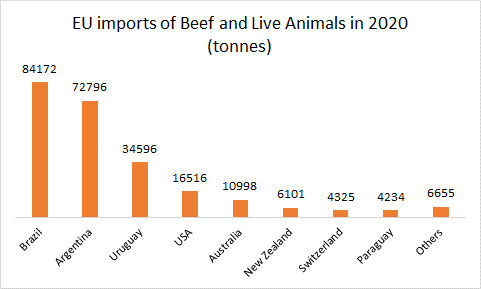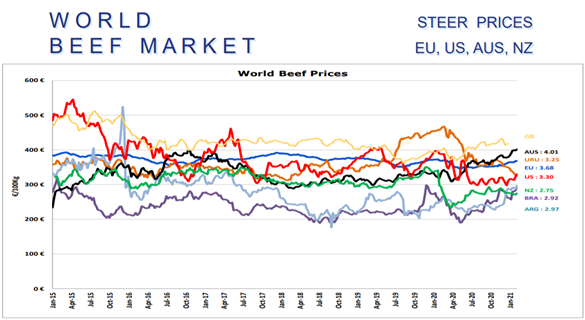Are you ready to beef-up amid the EU-Mercosur trade deal?
The global trade market may witness a new historical coalition as the trade agreement between the European Union (EU) and the Southern Common Market (Mercosur), consisting of Argentina, Brazil, Paraguay, and Uruguay, worth USD 19 trillion was first agreed on June 28, 2019, and continues to be discussed. If ratified and legally bound, the phenomenal trade agreement will encompass 780 million consumers and 25% of the world GDP. Under this agreement, both the EU and Mercosur are expected to increase exports at a zero or minimal tariff rate, which could increase the competitiveness of their export products but also, may drive out local producers due to cheaper imports.
Even so, its double-edged trait isn’t the direct reason behind the delay in the deal’s ratification. The environmental hazard of deforestation in Amazon, Brazil is creating an uncompromisable conflict with the EU Paris agreement which has raised disapprovals from a number of EU constituents such as France, the Netherlands, Austria, and Belgium’s Walloon region. Without concrete steps from Brazil to protect Amazon’s rainforest from further deforestation, the trade agreement seems to remain stalled.
Changes in EU beef import tariffs
Nevertheless, in the EU’s perspective, when the trade agreement takes place, several agricultural products will be affected wherein some would benefit from the seasonal differences between the EU and Mercosur while other import sensitive products, ones that are particularly vulnerable to competitions from imports of other countries, like beef would experience an increase in competition from increased exports of Mercosur. Equally taking these into account, unlike other products that will receive zero tariffs, beef, one of the EU’s import sensitive products, will be given preferential treatment where only up to a pre-agreed volume of beef imports from Mercosur will enjoy the reduced tariffs.
Previously, beef imports to the EU were slapped with 12.8% to 20% tariffs, in addition to other fines, and under the new trade deal, this has been reduced to 7.5% tariffs for a total of 99K tonnes of fresh and frozen beef from Mercosur. The tariff reduction will be implemented in up to 10 years’ time and it is expected that the total beef quota given to Mercosur will constitute 1.2% of the total European beef consumption, totaling around 8 million tonnes annually after 5 years of phasing in, based on the European Commission’s projections. Although this quota isn’t expected to place upward pressure on the beef production of Mercosur as production from Brazil, solely, already far exceeds the new quota, it is expected to affect the market share of current beef exporters to the EU and the EU’s own beef suppliers.

Source: fern
Effect on the EU Beef Market Shares
As of 2020, the top five exporters of beef and live animals to the EU are Brazil (35%), Argentina (30.3%), Uruguay (14.4%), the US (6.9%), and Australia (4.6%). The combined export share of Brazil and Argentina constitute around two-third of total beef and live animal imports of the EU. Moreover, the combined export value of Mercosur is 196K tonnes or 81.5% of EU imports of beef and live animals in 2020. It is evident that even before the trade deal, Mercosur constituted the majority of beef and live animal imports of the EU. With an already established huge market share of Mercosur, especially for Brazil and Argentina, the new quota is not expected to create a phenomenal increase in beef exports to the EU. but it will still allow Mercosur countries to expand their share with more affordable prices from reduced tariffs and lower production costs compared to their European counterparts or the US.

Source: European Commission, Tridge
Effect on the domestic EU market beef prices
The price ranges of Argentina and Brazil are the lowest, ranging from EUR 200 to EUR300 (USD 250-USD 350) during 2015-2021. On the other hand, the beef steer price of the EU is around EUR 400 (USD 490) and the US around EUR 300 to EUR 500 (USD 350- USD 600) during the same timeframe. However, in January 2021, the beef prices of Brazil, Argentina, and the US showed a converging trend as the prices of Brazil and Argentina increased and the US decreased. EU beef prices remained almost constant and substantially higher than the previously mentioned countries’ prices. When the EU-Mercosur trade agreement ratifies, the domestic EU beef market is expected to experience a decrease in market prices as cheaper Mercosur beef products come in and other countries, in order to compete with Mercosur, will also try to decrease their price accordingly.

Source: European Commission
Sources
European Commission. Better export opportunities for European farmers and food producers
fern. The EU-Mercosur Trade Agreement
United States Department of Agriculture. European Union (EU)- Mercosur trade agreement- A preliminary analysis